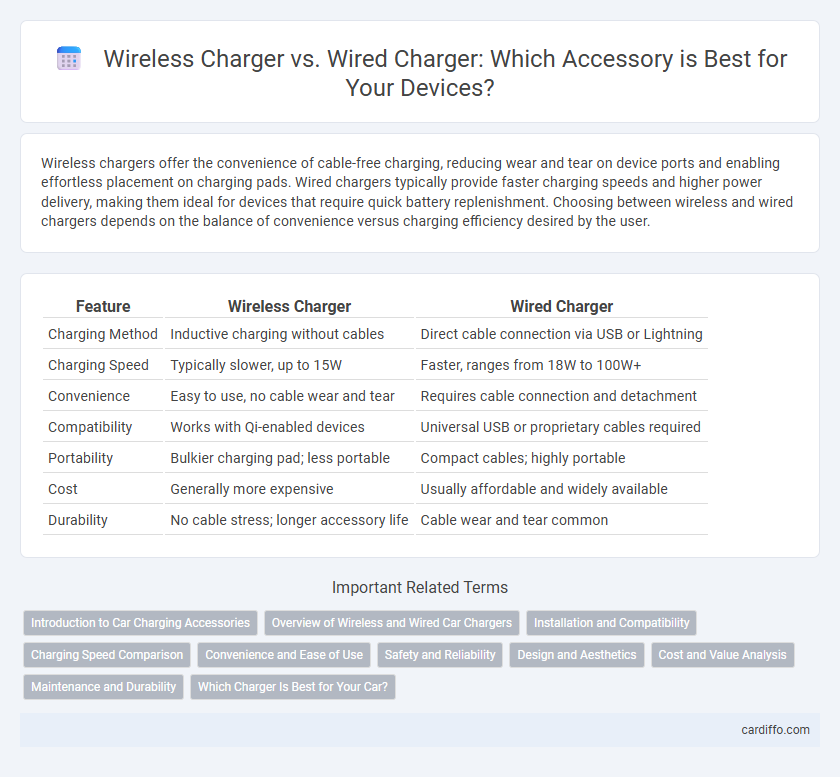Wireless chargers offer the convenience of cable-free charging, reducing wear and tear on device ports and enabling effortless placement on charging pads. Wired chargers typically provide faster charging speeds and higher power delivery, making them ideal for devices that require quick battery replenishment. Choosing between wireless and wired chargers depends on the balance of convenience versus charging efficiency desired by the user.
Table of Comparison
| Feature | Wireless Charger | Wired Charger |
|---|---|---|
| Charging Method | Inductive charging without cables | Direct cable connection via USB or Lightning |
| Charging Speed | Typically slower, up to 15W | Faster, ranges from 18W to 100W+ |
| Convenience | Easy to use, no cable wear and tear | Requires cable connection and detachment |
| Compatibility | Works with Qi-enabled devices | Universal USB or proprietary cables required |
| Portability | Bulkier charging pad; less portable | Compact cables; highly portable |
| Cost | Generally more expensive | Usually affordable and widely available |
| Durability | No cable stress; longer accessory life | Cable wear and tear common |
Introduction to Car Charging Accessories
Car charging accessories significantly enhance the convenience of powering devices on the go, with wireless chargers offering cable-free ease and wired chargers delivering faster, more reliable charging speeds. Wireless chargers rely on electromagnetic fields to transfer energy, making them ideal for maintaining a clutter-free car interior, while wired chargers use USB or USB-C cables to connect directly, supporting higher wattages and faster device compatibility. Choosing between wireless and wired car chargers depends on user preferences for speed, convenience, and device compatibility during travel.
Overview of Wireless and Wired Car Chargers
Wireless chargers use electromagnetic fields to transfer energy between a charging pad and the device, providing convenience without cable clutter. Wired chargers rely on direct cable connections, typically offering faster charging speeds and compatibility with a broader range of devices. Car wireless chargers often feature built-in mounts and Qi standard support, while wired car chargers utilize USB ports or cigarette lighter adapters for power delivery.
Installation and Compatibility
Wireless chargers offer seamless installation with no cables, requiring only a compatible Qi-enabled device and a power outlet, enhancing convenience and reducing clutter. Wired chargers necessitate proper cable connection and may require specific port compatibility such as USB-C or Lightning, potentially limiting device options. Compatibility varies significantly, as wireless chargers support a wide range of devices with Qi standards, while wired chargers demand matching connectors and sometimes manufacturer-specific chargers for optimal performance.
Charging Speed Comparison
Wireless chargers typically offer slower charging speeds compared to wired chargers due to limited power transfer efficiency, with wireless power outputs often ranging from 5W to 15W, while wired chargers can deliver up to 65W or more depending on USB Power Delivery standards. Wired charging significantly reduces charging time, supporting rapid charge protocols like Quick Charge and Power Delivery that enable devices to reach 50% battery in under 30 minutes. Device compatibility, charger wattage, and cable quality are critical factors influencing the effectiveness and speed of both wireless and wired charging methods.
Convenience and Ease of Use
Wireless chargers offer unparalleled convenience by eliminating the need for cables, allowing users to simply place their devices on a charging pad for seamless power replenishment. Wired chargers, while requiring physical connections, tend to provide faster charging speeds and more reliable energy transfer. For everyday ease of use, wireless charging excels in clutter-free environments, whereas wired charging suits scenarios where rapid, consistent power delivery is essential.
Safety and Reliability
Wireless chargers minimize risks of electrical shocks and short circuits by eliminating exposed cables, enhancing safety during use. Wired chargers offer consistent and faster power delivery with proven reliability, as their direct connection reduces power fluctuations. Both charging methods incorporate safety features like overcurrent protection and temperature control to ensure device and user safety.
Design and Aesthetics
Wireless chargers feature sleek, minimalist designs that enhance modern aesthetics by eliminating cables and allowing seamless integration into various environments. Wired chargers often prioritize functionality over form, with bulkier connectors and visible cords that may disrupt a clean setup. The wireless approach supports a clutter-free look, appealing to users seeking both elegance and convenience in their charging accessories.
Cost and Value Analysis
Wireless chargers generally have a higher upfront cost compared to wired chargers due to advanced technology and convenience features. Despite the premium price, wireless chargers offer value through reduced cable wear and easier device placement, enhancing user experience. Wired chargers remain cost-effective with faster charging speeds, making them a practical choice for budget-conscious consumers prioritizing efficiency.
Maintenance and Durability
Wireless chargers offer reduced wear and tear on device ports since they eliminate physical cable connections, enhancing long-term durability and ease of maintenance. Wired chargers, however, can experience frayed cables and port damage from frequent plugging and unplugging, requiring more regular inspection and replacement. Quality wireless charging pads with stable heat management systems typically ensure prolonged device and accessory longevity compared to conventional wired solutions.
Which Charger Is Best for Your Car?
Wireless chargers provide convenient, cable-free charging for your car, reducing clutter and minimizing wear on charging ports. Wired chargers deliver faster, more reliable power transfer, making them ideal for quick top-ups during drives. Choosing the best charger depends on your priority for convenience versus charging speed in your vehicle.
Wireless Charger vs Wired Charger Infographic

 cardiffo.com
cardiffo.com